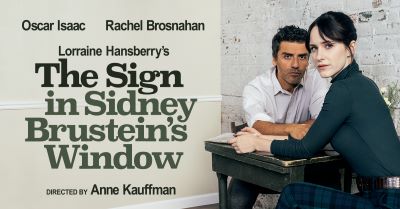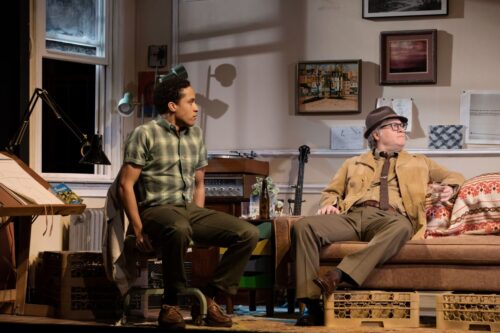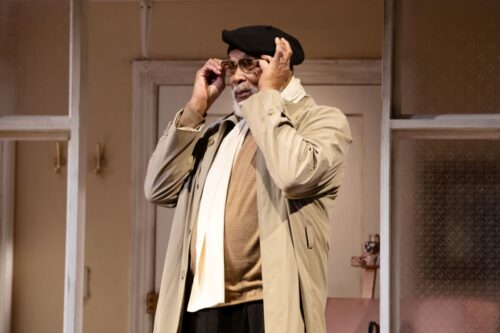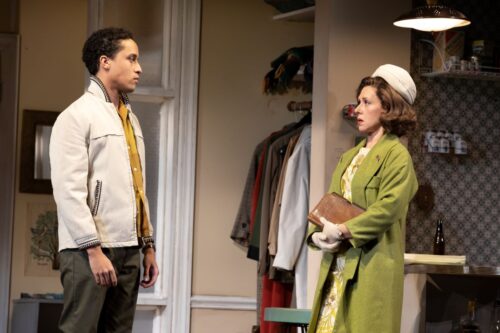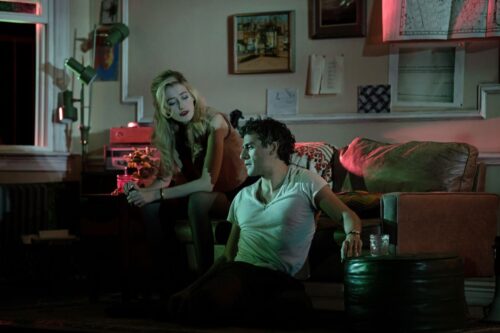A GOOD SIGN FOR BROADWAY
First-rate performances and Anne Kaufman’s near-flawless direction work well to conceal the few shortcomings in Lorraine Hansberry’s thoughtful and compelling The Sign in Sidney Brustein’s Window, making this revival — which recently moved from BAM to Broadway’s James Earl Jones Theater — rich with energy, emotion and life. Ms. Kaufman’s dynamic staging of this 1964 offering paints a vivid picture of 1960s Greenwich Village hipsters, who all try in their own ways to keep their souls and deeds pure in the face of a corrupt world.
Oscar Isaac is outstanding as Sidney Brustein, a beatnik type who, after running an alternative, folk-music nightclub into the ground, takes over a tiny neighborhood newspaper. A former leftwing political activist, Sidney has become disillusioned with politicians, declaring that his paper will be about art, not activism. Before long, however, comes an idealistic reformer, Wally O’Hara (convincingly rendered by Andy Grotelueschen, who appears to be referencing Bernie Sanders in both appearance and manner), who is running for local office as an underdog. Sidney, excited and optimistic once more, endorses Wally in his paper and puts a campaign sign in his apartment window.
Sidney’s noticeably younger wife Iris (an excellent Rachel Brosnahan) is an aspiring actress working as a waitress, who can’t seem to get a part, because, as she explains it, she’s unwilling to trade sex for favors, which we learn early on isn’t necessarily her biggest obstacle. We meet other Village denizens: There’s Sidney’s upstairs neighbor David (played with delightful verve by Glenn Fitzgerald), a talented gay playwright who strives only for artistic truth, as opposed to, say, money or fame; Max (Ralph Nash Thompson), an avant-garde artist of high mind but questionable gifts; his ex-communist friend Alton (a convincing Julian De Niro), a very light-skinned black man who is in love with a white woman — Iris’s younger model sister Gloria (played with a wonderful combination of strength and vulnerability by Gus Birney). Miranda Silverman rounds out the cast as Iris’s older, well-married sister Mavis. A glowing example of upper-middle-class white privilege, Mavis would have been easy to play as a caricature. But Ms. Silverman, who just received a Tony nomination for her performance, portrays Mavis with compassion and humanity, allowing us to have respect and empathy for her at the same time as we find many of her attitudes and views objectionable.
This production pulls one in immediately, which seldom happens even with the best of shows. The action plays well on dots’ realistic and admirably accommodating set, and is well-accented by John Torres’s generally practical but occasionally expressive lighting. The show flows from beginning to end, leaving one with a feeling of near perfect satisfaction. That said, there are a few issues that leave one wondering if maybe some things could have been done a little better. The inner conflicts of the characters, which amount to the spiritual versus the practical, could have been made more vivid if the stakes for them were a little bit higher. As it is, the most dramatic turn in the play happens to one of the least explored characters, which doesn’t feel like the strongest move. The problems in Sidney and Iris’s marriage, to which Ms. Hansberry devotes a good portion of the first act are, to a large extent, left floundering and unresolved in the second. Also, considering Gloria’s role in the drama, it’s puzzling why she doesn’t make a brief appearance at the beginning. Among other things, this would have served as a useful juxtaposition to her later self. Additionally, when she does appear, Ms. Kaufman never gives us a good look at her, which may have been intentional, but which feels like a flawed decision — Ms. Kaufman’s only mistake in my opinion.
photos by Julia Cervantes
The Sign in Sidney Brustein’s Window
James Earl Jones Theatre, 138 W 48th St
ends on July 2, 2023
for tickets, visit Telecharge and The Sign on Broadway
